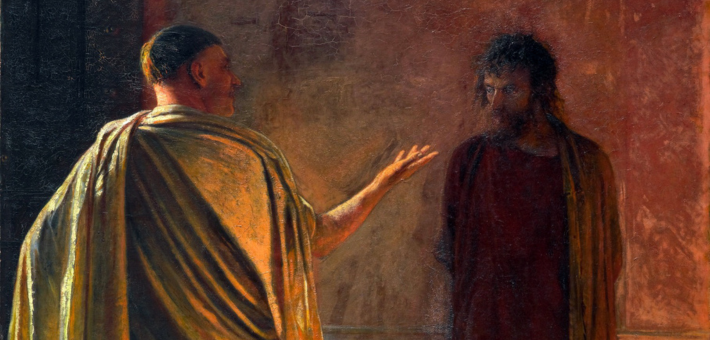Commentary on 2 Samuel 23:1-7
This week’s passage contains a song of David, curiously introduced with the superscription, “The Last Words of David,” even though his narrative will continue to his death in 2 Kings 2:10. The reference to words is an important signal. From Genesis 1, the speaking of words equates power. David’s own strength is rapidly waning, thus this song is placed here before the end of 2 Samuel.
The superscription is more developed than the familiar descriptor “Psalm of David,” as is frequent in the Psalter. It has autobiographical movement beginning from David’s identification as the “son of Jesse,” invoking his calling as a boy into a fight with Goliath. He is then described as “exalted,” “anointed,” and “favorite.” It appears that the prior wrongdoings in complicity with the Philistines and sexual assault–murder in the Bathsheba episode are ignored or forgotten. Rather, David is described as powerful with divine sanction.
Claim of divine authority (2–3a)
This superscription naturally leads into the bold claim that these words are of divine inspiration as presented in two bicola.1 The imagery of the first bicolon (verse 2) shows David as a passive agent of God’s direct speech. He is merely a container for the Lord’s spirit and the bearer of divine speech. The second bicolon (verse 3a) makes God the subject, or the nominative force in each line, described as “God of Israel” and “Rock of Israel.” This heightened language brings anticipation for the authority in the ensuing words.
Divine rule is just rule (3b–4)
The next section ascribes divine rule as just. Although the context is for Israel’s kingship, it has a hermeneutical reach that extends to any zones of power. Just rule recognizes appropriate reverence and fear of God. This is not restricted to Iron Age kingdoms, but applies to all spaces of power: homes, churches, classrooms, corporations, neighborhoods, et cetera. All of these spaces can have power and, therefore, abuses of power. But a true divine rule is just at its core. Notably, verse 4 provides three analogies for the impact of power: light, the sun, the rain. All of these benefits equally distribute to all people and not just the elite.
Divine rule grants abundance (5)
The poem moves explicitly to abundance. The abundance is in the form of longevity (“everlasting covenant”) as well as material abundance that “prospers” and even satiates “desire.” Before you develop too much of this idea of prosperity, remember that the song addresses a pre-monetary agrarian society. These economies do not have the capacity to hoard like in a modern-day economy. Prosperity was not massive retirement accounts and fancy homes, but rather enough food to comfortably feed one’s family.
The godless as antithesis of divine rule (6–7)
The poem ends with descriptors of godless characteristics. The godless bring pain like thorns. But unlike the eternal covenant, this pain is only ephemeral. Imagine a dry thorn on fire. It will burn up instantly. In the long game, the everlasting covenant of divine rule overshadows the moments when the godless seem to have control.
Because Israel was a monarchy, many biblical passages naturally revolve around royal themes. But how do we communicate our readings to modern audiences, far removed from meaningful monarchies? Today, royal houses in much of the world are symbolic at best, and subject to popular media scorn at worst. How is this royal song meaningful today? This is a challenging question for preachers.
Furthermore, I am writing this commentary in spring 2024, knowing that this will be released in November 2024, just after the United States general election. As of today, all signs point to a deeply divisive election that will be very competitive. Both presidential candidates have remarkable levels of disapproval, fueled by the drive for social media engagement, which often reifies our own opinions. In addition to the presidency, 34 Senate seats and all House seats will be contested. Whatever the election day outcome, there is sure to be a threat of lawsuits and violence. Now in the spring of 2024, this public anxiety is palpable on all sides of the political spectrum.
In this context, we can draw on the universalism of the human experience that connects 2024 to the end of David’s reign. Fear often accompanies uncertainty. As David’s life came toward an end, people were naturally anxious about royal transitions. They knew that godless leaders could cause pain. But in the longer timeline, God’s sovereignty endures. God’s sovereignty extended far beyond the reigns of Saul, David, and Solomon. It will surely extend far beyond the lifetimes of anyone reading this commentary, preaching on this text, or hearing a sermon in this lectionary cycle!
The song does not deny the painful thorns of godless rule, but it does put it in perspective. Such rule, as painful as thorns can be, will not last. In fact, they are a vapor compared to the enduring just rule of God. The people of God did not prosper because of the reigns of the Davidic line. They prospered despite it!
We cannot predict the election results for the presidency, Congress, or local seats (though many people try—look at the commodification of pundit prediction sites). But the song of 2 Samuel 23 does give us a somber reminder of the true place of power and authority in our Lord. I guess we still live under divine rule after all.
Notes
- “Bicolon: two lines of poetry set in parallelism to each other, referred to as a single unit (plural: bicola.” https://libguides.northcentral.edu/biblicalpoetry#:~:text=Bicolon.


November 24, 2024